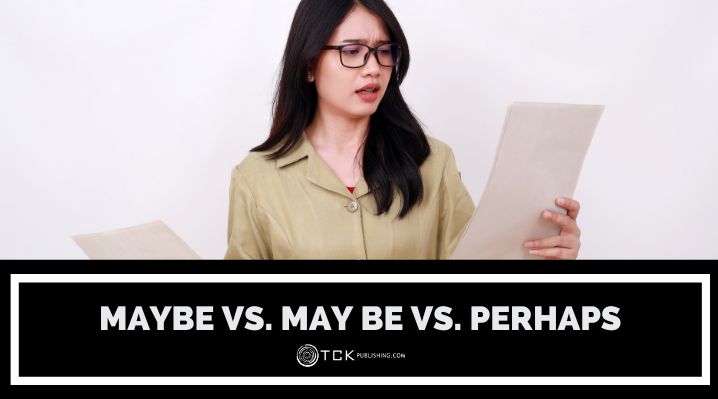
Words—they trip you up from time to time. Especially the ones that look, sound, and are used the same way. Like maybe and may be, and perhaps.
If you’ve ever been stuck wondering what’s the difference between these three, you’re not alone. They’re similar not only in spelling (at least, the first two) but also in meaning. How you use them, however, is different.
Maybe Vs. May Be
Maybe is an adverb that indicates possibility or uncertainty. It is also a synonym of “perhaps” and “possibly”.
- Maybe I’ll attend the ball.
- She’s not sure, but maybe he’ll call later.
May be is a verb phrase that also indicates possibility or permission. It is composed of the modal verb “may” and the verb “be”.
- He may be running late because of traffic.
- This idea may be worth exploring further.
The Common Error
Maybe and may be are two different parts of speech, and so can’t be substituted for each other. This is what most people don’t realize, apart from their visual and auditory likeness.
This creates contextual misunderstanding. For example:
- He maybe late to the meeting.
- He may be late to the meeting. (May be works as the verb phrase.)
The first sentence is incorrect because it lacks a verb. Nothing connects “He” to the adverb “late”. But it sounds correct because it sounds the same as the second sentence.
In the second sentence, may be acts as that connection. “May” (expresses possibility) modifies “be” (expresses a state of being) and “be” modifies the adjective “late”. And so it connects the subject “He” to the state of being late.
Only a space separates the two, but that space makes the entire difference. The English language has many word pairs like these, including awhile vs. a while, and altogether vs. all together.
Maybe vs. Perhaps
Another point of confusion is between maybe and perhaps. Both words are adverbs and can be used interchangeably to mean “possibly.” However, the choice between them can depend on the tone and style of your writing.
Maybe is usually used in informal or conversational contexts. It’s a casual way to express uncertainty or possibility.
- Maybe we should order pizza for dinner.
Perhaps is generally preferred in formal or written contexts. It gives a slightly more polished or thoughtful tone.
- Perhaps we could schedule the meeting for next week.
The difference can be subtle:
- Maybe implies that something can happen, but it is not guaranteed. Perhaps hints more at an alternative.
- Maybe feels more resigned, as if it’s already possible or left to chance. Perhaps implies that something depends on future events or discoveries.
- Maybe it’s meant to be. (It’s up to fate.)
- Perhaps it will rain later. (It depends on what happens.)
- Maybe gives off uncertainty. Perhaps is assertive but polite.
- Maybe we should go home now. (You’re unsure if it’s the right idea.)
- Perhaps we should go home now. (A polite suggestion, but you mean it.)
That being said, there is no major difference between the two. It all boils down to preference, tone, and style. You can use either one, as long as it doesn’t make the sentence sound awkward.
Tips on Correct Usage
Understanding when to use maybe vs. may be is key to writing clear, accurate sentences. Here are some practical tips to help you master their usage:
Check for a verb.
If the sentence already has a main verb, “maybe” is likely the right choice. If none, may be (a verb phrase) might be needed to act as the verb.
Substitute to test it.
If you’re unsure with maybe, try replacing it with “perhaps.” If you’re unsure with may be, try replacing it with “might be.”
If the substitution doesn’t make sense, the other option is likely correct.
Rewrite your sentence.
If you don’t want to stress about it, simplify! Rewrite the sentence so you don’t have to use any of the two.
Conclusion
Mastering maybe, may be, and perhaps is all about understanding their roles in a sentence. And don’t forget to consider your writing style and tone. With a little practice, you’ll be able to spot the difference instantly.
Do you trip over maybe, may be, and perhaps? Share your thoughts below!
If you enjoyed this post, then you might also like:
- Biannual vs Biennial: Which Should You Use?
- Whoever or Whomever? When to Use Each
- Beside vs Besides: Which Should You Use?
- Till vs. Until: What’s the Difference?

Cole is a blog writer and aspiring novelist. He has a degree in Communications and is an advocate of media and information literacy and responsible media practices. Aside from his interest in technology, crafts, and food, he’s also your typical science fiction and fantasy junkie, spending most of his free time reading through an ever-growing to-be-read list. It’s either that or procrastinating over actually writing his book. Wish him luck!
